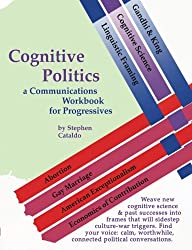George Lakoff talks about framing the issues: "protections," not "regulations." This article expands on George Lakoff's advice on framing. If you're not familiar with George Lakoff's ideas, you might want to start with one his books such as Don't Think of an Elephant, or read Chapter 1 of Cognitive Politics
But how do you frame the conversation?

Often, we frame conversations as competitive sports: we score points against each other. Or argue cases like two lawyers, ignoring any point not in our favor, even though no judge will decide our case. Or we read news looking for "ammunition," arguments to defeat the other side at Thanksgiving. Of course, if you fire artillery at someone, you have framed the conversation as one between combatants — there's no reason to be surprised that facts backfire: if we use facts like artillery, people will build bunkers.
We have to change the frame of the conversation, as well as the frame of the issue.
Escape the lawyer, sports team and army metaphors by being what they are not: be curious, listen, reciprocate, or use steel man (the opposite of strawman) techniques. Try to learn something interesting from the other side or see where they are coming from — you simply have to be curious if you want curiosity reciprocated.
These techniques don't require false equivalencies. I'm not going to change my mind about swastikas. A President who can't manage to denounce a mob with torches chanting the Nazi "blood and soil" slogan is as bad as we think. Changing wavering minds and votes means finding ways to be curious, anyway. When you want the conversation to feel mutually curious but you're really not, a trick is to look for smaller ways to be curious: Wonder why a frustrated person voted for Trump, what led to their decision, when did it happen, what do they think Trump’s victory will lead to? Wonder which issues are most important to them, likely different than the ones we’re focused on. If I hope to convince someone about vitally important issues, I have to evoke a conversation that involves curiosity, connection and ultimately being on the same team or in the same community. If I want to talk with someone and convince them, I can't fire artillery, be their judge, or score points against their team.
A conversation framed as "what is most important to you" sometimes leads to reciprocation instead of competition. If you want to flip from an underlying metaphor of competing lawyers, aim to be one team investigating or researching together. Conversations can collect evidence: bring up the points for the other proposition, model a participatory process to see what is happening together.
I have no power to implement my judgment, so playing judge is powerless — not having the power to judge and so not playing judge is different from pretending no political position deserves judgment. There are always ways to be curious about the details, and so have a conversation where the other person is at least invited to be curious — and where anyone witnessing your conversation but not taking part can see you reach out, rather than jumping into the mud with a troll.
Trump is a master at this kind of framing. He imagines and frames a world you can choose to be loyal to him and everyone who is on his side, or you can be an outsider and extremist. When Colin respectfully and quietly takes a knee to protest police brutality and racism, Trump transforms the frame to one respecting the flag and (somehow) veterans. In Trumps frame, the issue is the flag, not racism. And the conversation is one of people unified behind the flag against people protesting the flag. Progressives have a tendency to wander into conservative frames, and most of the conversations on social media that I see are now about Trump's frame, not Kaepernick's.

PS: Angry? If you are angry and want to express it — not the most important goal politically but it's hard to leave behind — remember that lawyers might try to fluster opposing council, and couldn't care less that the other lawyer is angry at them. If you're going to get angry and make it personal, keep it personal, do it within a shared value system where you might be heard — about how a person treats you, and not their political views. This is extremely difficult and not very important, where welcoming a wavering swing voter is much easier and much more important, but I think it provides perspective and might matter in family gatherings where politics is sometimes a cover for verbal abuse or bullying.



